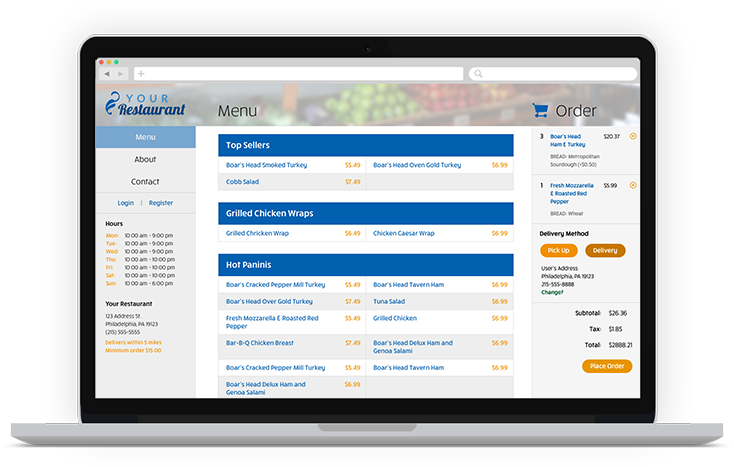“Don’t be an item on someone else’s menu.”
The cryptic message on its Twitter account seems to encapsulate Ontray’s sales pitch pretty well: the N3rd Street startup, a spinout from dev shop Jarvus Innovations, is offering restaurants a way to set up delivery operations through their websites and cash in on the data and brand consistency.
“The company started in 2015 when we noticed that restaurants were spending a lot to go to Grubhub,” says CEO Tyler Wiest. “But that didn’t guarantee that people were spending money on them. We want to give control of online order back to the industry.”
The way it works is Ontray helps restaurants handle online orders themselves. Think of it as “power-charging” restaurants’ existing sites, Wiest said. It looks like this:

Restaurants have two payment options: they can give Ontray 5 percent of sales for use of the platform or tack on a fee to customer orders. In exchange, sure, they get to soup up their website, but as you might have imagined, data is also part of the pitch.
“We let them own their data and use it to make data-driven marketing decisions,” Wiest said.
Ontray is incubated within Jarvus’ N3rd Street offices. Wiest says the dev shop has invested close to $100,000 in seed cash. Partner John Fazio serves as chairman of Ontray’s board and interim COO while a permanent replacement is found.
Needless to say, the food and delivery-related tech space is crowded. On the consumer-facing side there’s GrubHub and UberEATS and Postmates and EAT24. There’s Caviar, which Square acquired in 2014. There’s Philly’s own goPuff for the munchies. Until earlier this year, in the B2B space there was Navy Yard-based Zoomer, which was later acquired by EatStreet. Geez, even Aramark got in the game by acquiring a dorm-room-focused delivery company in San Francisco called Tapingo.
Why is Ontray’s play clever? The young startup is aiming to sign-up restaurants that already have delivery operations set up, saving them the complications of hiring (more so, retaining) delivery drivers or establishing high-maintenance GPS platforms. So far, the team has signed up 16 restaurants, mostly from the Fishtown area, including its flagship client: Trio’s Fresh Italian.
The challenge, as with most startups as this stage, is scaling. The company is currently raising some additional cash and will be using that to grow its footprint both regionally and nationally. “We could theoretically operate anywhere,” Wiest said.







